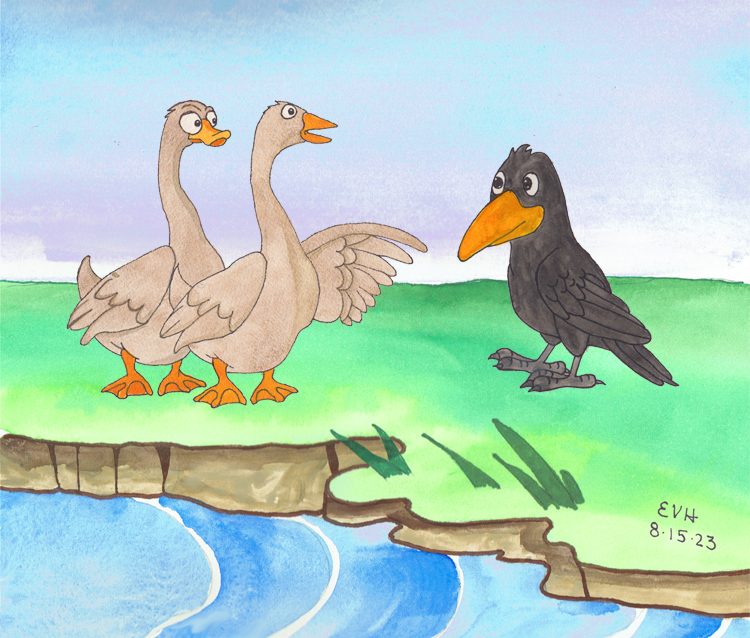
Jataka 451
Cakka Vāka Jātaka
The Handsome Goose
as told by Eric Van Horn
originally translated by H.T. Francis and R.A. Neil, Cambridge University
originally edited by Professor Edward Byles Cowell, Cambridge University
This is a simple story about the benefits of virtue. In it, a crow does not listen to the advice of a handsome goose who is attractive because of his virtue in this and previous lives.
“Fine-colored art.” The Master told this story when he was living at Jetavana. It is about a greedy monk. This man, it is said, was dissatisfied with his monk’s robes and so forth. He used to march about asking, “Where is there a meal for the Saṇgha? Where is there an invitation?” And when he heard the mention of meat, he showed great delight. Then some well-meaning monks, from kindness towards him, told the Master about it. The Master summoned him and asked, “Is it true, brother, as I hear, that you are greedy?” “Yes, my lord, it is true,” he said. “Brother,” the Master said, “why are you greedy after embracing a faith like ours that leads to liberation? The state of greed is wicked. Long ago because of greed, you were not satisfied with the dead bodies of elephants and other meat in Benares, and you went away into the mighty forest.” So saying, he told this story from the past.
Once upon a time, when Brahmadatta was King of Benares, a greedy crow was not content with the corpses of elephants in Benares and all the other meat to be found there. “Now I wonder,” he thought, “what the forests may be like?” So off to the forest he went. But there he was not satisfied with the wild fruits that he found there, and he proceeded to the Ganges. As he passed along the bank of the Ganges, he saw a pair of handsome geese. He thought, “Those birds are very beautiful. I suppose they find plenty of meat to eat on this Ganges bank. I will question them, and if I, too, can eat their food, doubtless I will have a fine color like them.” So perching not far from the pair, he put this question to the healthy goose by reciting two stanzas:
“Fine-colored you are, fair of form, all plump in body, red of hue,
O Goose! I swear you are most fair, your face and senses clear and true!
“A-sitting on the Ganges bank you do feed on the pike and bream,
Roach, carp, and all the other fish that swim along the Ganges stream!”
The handsome goose contradicted him by reciting the third stanza:
“No bodies from the tide I eat, nor lying in the wood,
All kinds of weed—on them I feed. That, friend, is all my food.”
Then the crow recited two stanzas:
“I cannot credit what the goose says about his meat.
Things in the village doused with salt and oil are what I eat,
“A mess of rice, all clean and nice, which a man makes and pours
Upon his meat, but yet, my color, goose, is not like yours.”
Thereupon the goose recited to him the remaining stanzas showing the reason of his ugly color and declaring righteousness:
“Beholding evil in your heart, destroying humankind,
In fear and fright your food you eat, therefore this hue you find.
“Crow, you have erred in all the world by wrongs of former lives,
You have no pleasure in your food, ’tis this your color gives.
“But, friend, I eat and do no harm, not anxious, at my ease,
Having no trouble, fearing nothing from enemies.
“Thus you should do, and mighty grow, renounce your evil ways,
Walk in the world and do no harm, then all will love and praise.
“Who to all creatures kindly is, nor wounds nor makes to wound,
Who harries not, none harry him, to him no hate is found.”

Figure: Lacking virtue, “therefore this hue you find.”
When the man heard this, he answered, “Well, come in and sit down, and you shall have a little.” Sakka entered, repeating these verses, and then he sat down.
“Therefore, if you wish to be beloved by the world, abstain from all evil passions,” said the goose, declaring righteousness. The crow replied, “Don't lecture me on the manner of your feeding!” And crying “Caw! Caw!” the crow flew away to the dunghill of Benares.
When the Master ended this discourse, he taught the Four Noble Truths. At the conclusion of the teaching, the greedy monk was established in the fruit of the Third Path (non-returner). Then the Master identified the birth: “At that time, the greedy monk was the crow, Rāhula’s mother was the mate of the goose, and I was the goose.”
